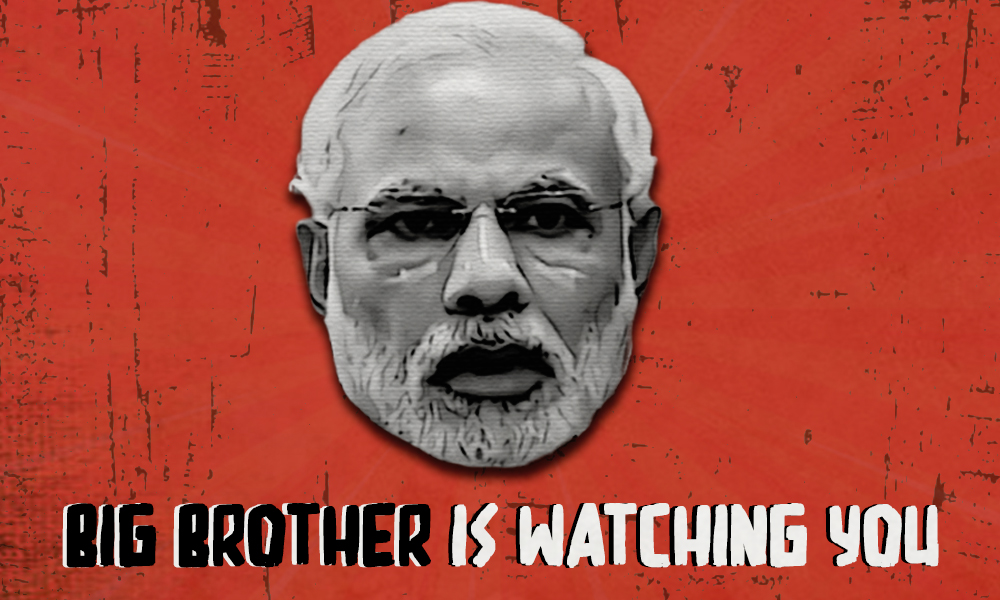
Big Brother Is Watching! Stark Similarities Between George Orwell's '1984' & Modi's 2020 India
27 Feb 2020 2:27 PM GMT | Updated 27 Feb 2020 2:48 PM GMT
Editor : Prateek Gautam |
A free soul who believes that journalism, apart from politics, should stand for social cause and the environment.
Written By : Sumanti Sen |
Sumanti Sen is an English Literature graduate who believes "there's just one kind of folks. Folks.".
Written By : Aditi Chattopadhyay
Aditi, part of the fact checking team of The Logical Indian likes to read, write, cook and laugh, in short live life as it is supposed to be. What makes her fascinated is to discover the truth behind a story and more often than not, it is either fact or myth at the end.
George Orwell's fictional depiction of the future world is eerily coming true.
"Under the spreading chestnut tree I sold you and you sold me:
There lie they, and here lie we
Under the spreading chestnut tree."
India has erupted into flames of protests in almost every city. In the backdrop of the anti-CAA protests, citizens are disgruntled. People are dissatisfied with the government.
They are angry that their freedom is being curtailed at every step and their opinions suppressed. They are enraged at how their dissent is being tossed about.
People are living in constant fear of being watched and monitored.
In a nutshell, people are living in '1984', even in 2020.
George Orwell's 1984 is a dystopian novel that depicts a society under constant surveillance under an authoritarian regime. To restrict people's freedom of speech, the government even imposes a new language: 'Newspeak.'
In Orwell's valley of fear, the ruling party, Ingsoc, has created a world where every individual is simultaneously watching and being watched through a series of telescreens set up in every nook and corner of the cities.
In this society, thinking of ideas that defy the rhetoric of the ruling party is considered a criminal offence, referred to as 'thoughtcrime.'
Although our society has not yet found ways to criminalise thoughts, Orwell's fictional depiction of the future world is eerily coming true.
The Logical Indian decodes how George Orwell's 1984 in an uncanny depiction of the world we are living in today.
Big Brother Is Watching You
1984 - The citizens of the dystopian country, Oceania, are constantly being watched through telescreens, their every step being monitored. The Party says that this surveillance is for the greater good of the country. Those who violate the Party's rules are labelled as 'traitors' and they are eventually 'vapourised.' The people of Oceania always see Big Brother's face plastered on posters on the streets, on their telescreens and stamped onto the coins - a constant reminder that they are being watched.
2020 - The world is moving into the Orwellian era where every movement is being monitored - not only bodily movements, but the likes and dislikes of an individual.
Internet freedom declined in India—the result of an increase in arrests for online activity and continued internet shutdowns during times of perceived unrest.
In its 2017 response to a Right to Information (RTI) request, the Ministry of Electronics and Information Technology confirmed that as many as 23,030 websites or URLs had been blocked. In another acknowledgement reflecting the scale of government blocking, the DoT confirmed in August 2018 that it had requested the blocking of 11,045 websites, webpages, and URLs since 2016. Some of the content that has been blocked includes social media networking groups and websites engaged in flaring up "anti-India" sentiments.
Controversies also continued around Aadhaar, the world's largest biometric identification system and a problematic draft data protection bill remains in limbo. Meanwhile, ahead of the 2019 elections, incumbents and candidates manipulated content, used bots and employed volunteers to push inorganic content and exacerbate existing social tensions for political gain. Within this environment, marginalized groups, in particular, experienced online harassment and trolling.
The Supreme Court ruled in September 2018 that the government's controversial biometric Aadhaar project is constitutional but set limits on the program's use. In March 2019, despite the court's restrictions, the government promulgated the Aadhaar Ordinance, allowing for the voluntary linking of Aadhaar numbers for commercial use.
Local authorities continue to restrict connectivity routinely in India justifying shutdowns on the basis of protests, misinformation, exams and to maintain public order, among other things.
The 'Child-Spies'
1984 - The child-spies are an important component of the Big Brother system that monitors the thoughts and activities of the citizens. Orwell writes that the children "were systematically turned against their parents and taught to spy on them and report their deviations." The motivation for the children to give up on their parents was being rewarded by public acknowledgement, being hailed as heroes.
2020 - In an uncomfortably similar scenario, a disturbing video surfaced in December 2019 amidst the anti-CAA protests where some children could be seen donning BJP caps, joyously walking and chanting slogans such as "Desh ke gaddaro ko, goli maaro saalo ko!" and "Aatankwaad ki kya pehchaan? Mulla, Masjid, Pakistan!" Hatred breeds more hatred. Children - the future of our country - should be protected from vile and hate, for their sake and the sake of the country.
Thought Police
1984 - The most terrifying part of the book is that one couldn't keep Big Brother out of one's head.
The real goal of Orwell's authoritarians in 1984 is to control the grey matter between the ears.
The Thought Police use psychological warfare and false-flag operations to entrap free thinkers or nonconformists and proceed to 'vaporize' or remove them from existence. In a sense, 1984 is largely a book about humans trying to hold onto the truth in the face of propaganda and power.
2020 - The rise in Modi fanfare overlaps with an exponential rise in the use of social media in India, a medium that this government has exploited over and over to mobilise public opinion, and use tags like "anti-national" to discredit anyone questioning the state narrative.
Speaking about the thought police, one can't help but mention the recent acts of Delhi police.
On 5th January, masked goons entered the Jawaharlal Nehru University campus with sticks and rods, beat-up the students and left — all under the watch of Delhi Police.
Dozens of goons, with their faces covered with mufflers, chanted slogans — "Desh ke gaddaro ko, goli maaro saalon ko," went so far as to not allow ambulances to reach the campus by puncturing tyres and smashing windows. And yet, all of this happened next to a police barricade and in front of a police detention van.
The police's words and actions in the following days have been questionable.
In the shooting incident that occurred on February 1 in Shaheen Bagh, the accused, Kapil Gujjar, who opened fire in Delhi's Shaheen Bagh during a protest against the Citizenship (Amendment) Act (CAA) on Saturday was sent to police remand for two days by a court in Delhi.
After being overpowered by police personnel, Kapil had chanted "Jai Shri Ram" and said, "hamare desh me aur kisi ki nahi chalegi, sirf Hinduon ki chalegi [only Hindus shall have a say in our country, no one else]," as he was taken into custody by the Delhi Police.
Bhim Army chief, Chandrashekhar Azad, was sent to 14 days' judicial custody a day after he led a massive protest against the Citizenship Amendment Act in Old Delhi.
It was alleged that he gave hate speech which resulted in violence at Delhi Gate.
He, however, said that he did not give any speech but only read the Constitution and also maintained that he was not at Delhi Fate or Daryaganj during the protests.
It should be noted that the police have not produced any video CD or transcript in connection with their allegations on Chandrashekhar Azad.
Ministry of Truth
1984 - As with the names of the other ministries in Oceania, the name Ministry of Truth means the exact opposite of what it says.
The Ministry of Truth is where lies are manufactured.
Winston Smith, the protagonist, works here, rewriting old news articles to reflect the Party's latest version of reality and throwing the old articles down a "memory hole" where they are incinerated.
The Ministry of Truth reflects the Party's belief that power is the only truth and that those with power can alter the "truth" into whatever they choose.
2020 - Winston's job finds relevance in real life in the form of fake news.
The Economic Times declared 2019 as the year of Fake News. The menace has chased us into 2020 as well.
India has the largest number of social media users in the world across platforms such as Facebook, YouTube, Instagram, WhatsApp, ShareChat, TikTok, etc.
Fake stories, rumours and hate speech spread through social media have been connected to various incidents of mob attacks and lynching in the country.
News is almost instantly available and shareable at the tap of a button.
Anyone with internet access can develop a blog or can produce a video without fact-checking or an editorial process of any kind.
Stories that exposes or ridicules conduct, doctrines, or institutions either by direct criticism or more often through irony, parody or caricature try to influence public opinion on a person, a policy, an event or another news story.
In recent years, there has been a resurgence of both false and misleading, highly opinionated articles on the web that are passed off as news.
Two Minutes Hate
1984 - "The horrible thing about the Two Minutes Hate was not that one was obliged to act a part, but, on the contrary, that it was impossible to avoid joining in."
The Two Minutes Hate is a ritual observance that is designed to use the collective rage of the people against supposed "enemies of the Party" to strengthen the Party's position among the people. The ritual serves to unify the people in the observance of the ritual.
Because Big Brother is proclaimed to be benevolent and good, any enemy is automatically evil and bad. While it is a "Two Minutes Hate" the desired end result is less hatred of Big Brother.
Ever noticed how viral outrage regularly rips through social media?
It's usually over just as quickly as it comes.
Then there's a lull for a few days and then we're on to the next outrage.
2020 - BJP's preference for Hate Speech is increasingly becoming apparent.
Even Mahatma Gandhi is not spared.
Referring to Gandhi, BJP MP from Karnataka, Anant Kumar Hegde, questioned the freedom movement led by the Father of the Nation and described India's independence struggle as an "adjustment" with the then British rulers.
Breaching traditional norms in public utterances is clearly the "new normal" in the BJP with Union Minister Prakash Javdekar labelling Delhi Chief Minister Arvind Kejriwal a "terrorist." Simultaneously, Uttar Pradesh Chief Minister Yogi Adityanath stuck to the "tukde-tukde gang (secessionist forces, a term now routinely used for opposition parties by BJP leaders)" narrative in his various public meetings in the run-up to the Delhi Assembly polls.
Doublethink
1984 - 'Doublethink' is a concept explained in the book as: "The power of holding two contradictory beliefs in one's mind simultaneously and accepting both of them… To tell deliberate lies while genuinely believing in them, to forget any fact that has become inconvenient, and then, when it becomes necessary again, to draw it back from oblivion for just as long as it is needed, to deny the existence of objective reality and all the while to take account of the reality which one denies – all this is indispensably necessary."
2020 - It is not uncommon today for politicians to make promises during election campaigns but not bother to keep these promises once they are elected to power. Recently, a case was filed by an advocate at the state high court, HK Singh, against Narendra Modi and Amit Shah for cheating people by promising them that ₹15 lakh would be credited to each person's bank account if the BJP came to power in the 2014 Lok Sabha polls.
In her Union Budget 2020 speech, Finance Minister Nirmala Sitharaman said that data must have strong credibility to combat the difficulties of real-time monitoring in the Indian economy, adding that the phrase "data is the new oil" has now become a cliché.
Sitharaman proposed a policy to increase focus on credible data-driven analysis, under private sectors, building data centre parks throughout the country. Contrasting the finance minister's ambitious claims, the budget documents were found with multiple discrepancies, that the ministry later denied.
On analysis of the documents on expenditure Budget, a disparity was found in the figures of budgetary allocation for many schemes and programmes under the Department of Health and Family Welfare.
In 1946, Observer editor, David Astor, lent George Orwell a remote Scottish farmhouse in which he wrote his new book, Nineteen Eighty-Four. It became one of the most significant novels of the 20th century.
So just like Winston, we still live in a constant state of uncertainty. We live in fear of being controlled, we dread surveillance and we are afraid of our dissent being crushed.
The circumstances surrounding the writing of Nineteen Eighty-Four make a haunting narrative.
The spine chilling similarities with modern times describe the curtailment of freedom in the real world by politicians and officials - alarmingly, nowhere and never more often than in 2020 India.
Also Read: How Depression & Other Mental Illnesses Consumed Characters Like Lady Macbeth, Snape & Hannah Baker
 All section
All section















